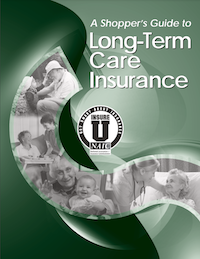Long Term Care Insurance
Will Public Assistance (Medicaid) Pay for My Long Term Care Costs?

Medicaid is a state and federally funded program designed to assist low income people who cannot afford to pay for medical care (in California the program is called Medi-Cal and in Massachusetts MassHealth). In order to qualify one must meet certain income and asset requirements. If you exceed these certain monthly income or asset requirements, you will not be eligible to receive Medicaid benefits. If you are unable to meet Medicaid asset limits at the time you need care, you may do what is known as a "spend-down" in order to meet the required limits. This means you spend your assets on LTC services until you exhaust your assets and meet qualifying limits.
When one spouse is living in a nursing home and the other spouse is living anywhere else, the spouse who is not living in the nursing home (the community spouse) is allowed to keep some or all of the nursing home resident’s income through an income allowance known as the Minimum Monthly Maintenance Needs Allowance (MMMNA). Every July 1st, this figure is supposed to change based on federal poverty level guidelines; however the U.S. Department of Health and Human Services did not revise the applicable guidelines in 2010 so the MMMNA remains unchanged through June 30, 2011.
Income Limits
Monthly income limits differ depending on whether you are single or married. For a married couple the community spouse can retain all of his or her income. The community spouse's income would not be counted in determining the applicant's eligibility for Medicaid; however, all of the applicant's income will go toward his or her long-term care except for certain deductions. These deductions may include a personal need allowance not to exceed $60 per month (less in some states); an allowance for a dependent child living at home; and the MMMNA (in 2010, this amount ranges from $1,821 to a high of $2,739 per month). If the community spouse's income is less than the MMMNA, a portion of the spouse's income may be used to meet that minimum. The balance will go to the nursing home providing care.
If you are single you cannot exceed Medicaid income limits. The limit for 2010 is about $2,000 per month but varies from state to state. If you exceed the income limits, some states make available "Miller Trusts" or "Qualified Income Trusts" which are instruments designed for those exceeding the limit but who do not receive enough monthly income to pay for their nursing care costs. These are complicated legal instruments and are best handled by attorneys who specialize in elder law and/or Medicaid planning.
Asset Limits (Countable and Non-Countable Assets)
Assets are divided into two categories; countable and non-countable. Countable assets consist of all investments such as stocks, bonds, mutual funds, checking and savings accounts and CDs. Countable assets also include your personal or real property as well as any art and collectibles.
Non-countable assets consist of personal possessions such as clothing, jewelry and furniture and the applicant's primary residence. Further, non-countable assets include one vehicle not to exceed $4,500 for unmarried applicants (there is no value limit for a vehicle for married applicants). Non-countable assets also include prepaid funeral plans, certain amounts of life insurance and retirement funds which cannot be cashed in because they are in payment status (however the latter will be considered under the income limits).
To qualify for nursing home coverage, the recipient's countable assets cannot exceed $2,000. The spouse of the Medicaid recipient may keep half of the couple's joint assets, up to $109,560 (in 2010). The community spouse may keep the first $21,912, even if it exceeds half of the couple's assets. These figures vary from state to state.
Look-Back Periods and Asset Transfers
In an attempt to make it more difficult for people who can afford to pay for LTC but try to qualify for Medicaid, Congress has passed several laws addressing Medicaid Planning. The first of which, passed in 1993, was called the Omnibus Budget Reconciliation Act. This law created long "look-back" periods into the financial history of the Medicaid applicant. Specifically, if an individual divested himself of assets within a certain period (regardless of intent), it would affect his or her ability to qualify for benefits. The "look-back" penalty would create a period of ineligibility which must be met before he or she can apply again.
Below are the asset transfer "look back" periods:
- Cash assets or assets in a Revocable Living Trust: 60 months
- Assets in an Irrevocable Living Trust: 60 months
In addition to the "look-back" periods, any income the individual receives, including that which the individual simply has access to for an Irrevocable Living Trust, will be included when determining the income qualifying limits. If a person applies for Medicaid and it is determined that assets were transferred within the "look-back" period, then a penalty will be imposed.
The penalty is calculated by taking the average monthly cost of the nursing home stay (for example $5,000) and dividing it into the value of the distributed assets. For example, if a person transferred $350,000, then divide $5,000 into $350,000 which yields a total of 70. Therefore, Medicaid would not pay benefits for a total of 70 months. There are exceptions to the transfer penalty for a disabled child or disabled individual under the age of 65.
Estate Recovery
In addition Congress passed an Estate Recovery Mandate to offset the cost incurred by Medicaid. This Mandate requires each state to provide for recovery from any of the recipient's remaining property (such as a home) after the recipient has died. The proceeds are used to offset the benefits paid on behalf of the recipient; however, the recovery cannot be set in motion until the death of the community spouse or while a child of the deceased, who is either under 21, blind or disabled, still resides in the home. Assets may include jointly held assets, assets in a Living Trust or life estate.
Back to Top | Back to Long Term Care Home
- Why You Need to Have a Plan for Long Term Care
- Won't the Medicare Program Pay for My Long Term Care Costs?
- Will Public Assistance (Medicaid) Pay for My Long Term Care Costs?
- What Is the Cost of LTC Services Where I Live?
- What Is Long Term Care Insurance and How Much Does It Cost?
- How to Design a Long Term Care Policy to Best Meet Your Needs
- What are "Partnership" Long Term Care Policies?
- Financial Strength Ratings for Top Long Term Care Insurance Companies

Serving all of Tampa Bay
Click here to request a Personalized Insurance Quote!
AH Insurance Services, Inc.
3015 N Rocky Point Dr E #319
Tampa, FL 33607
Phone: (727) 743-4532
Fax: (727) 231-0736
Email:
By calling one of these numbers or mailing to the above addresses, I understand I will be directed to a licensed insurance sales agent or broker.
Y0070_NA030737_WCM_WEB_ENG_02 CMS Approved 02/16/2016
WellCare (HMO) is a Medicare Advantage organization with a Medicare contract. Enrollment in WellCare (HMO) depends on contract renewal.
Last Updated: 03/19/2024
